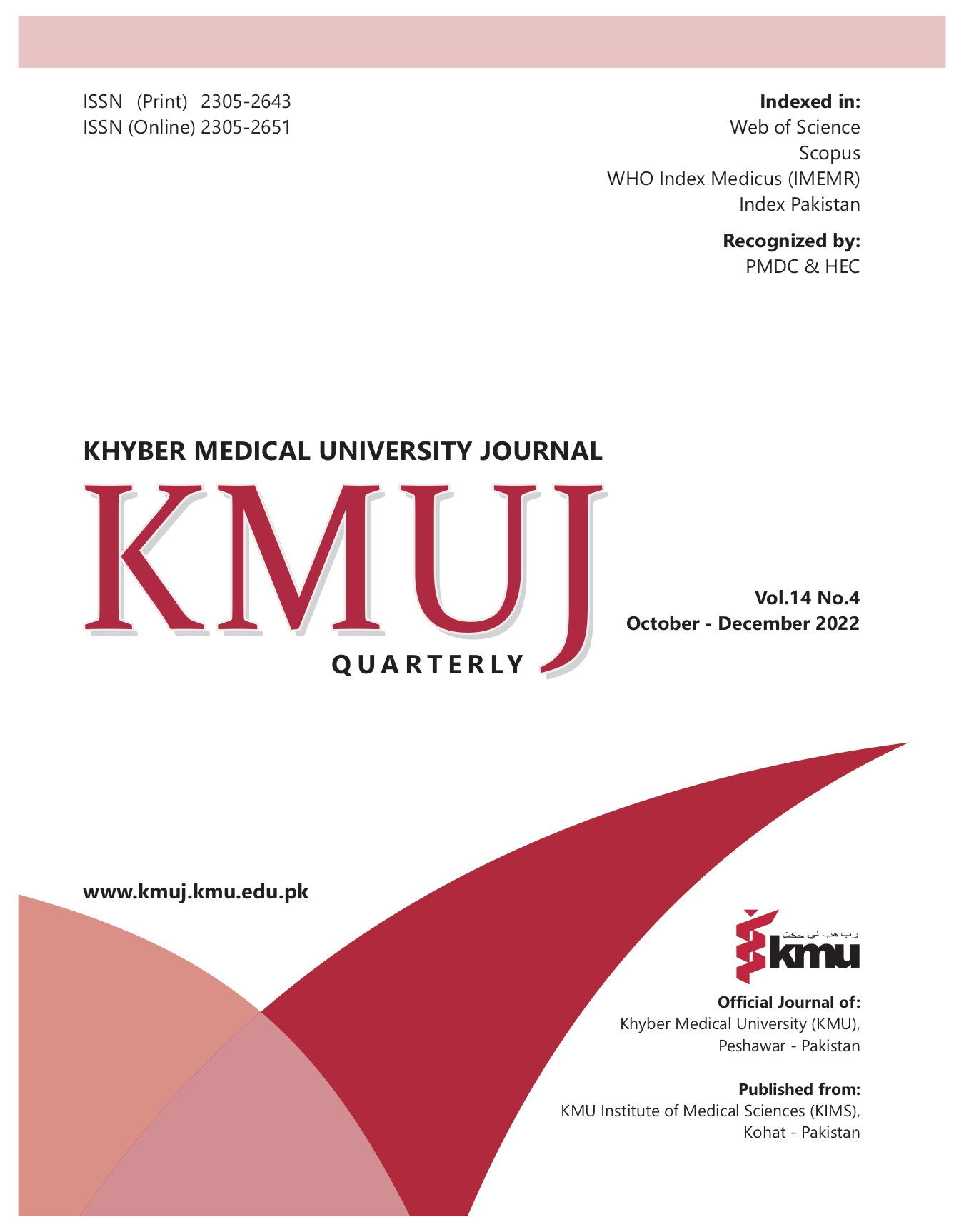POST-COVID COGNITIVE IMPAIRMENT AMONG GENERAL POPULATION OF KHYBER PAKHTUNKHWA: PAKISTAN
Main Article Content
Abstract
OBJECTIVE: To assess and compare the cognitive functioning of post-Covid patient with non-Covid person among the general population of Khyber Pakhtunkhwa province of Pakistan.
METHODS: This descriptive cross-sectional study was conducted from January to May 2021. Sample of 500 community members, including both post-Covid and non-Covid, from population of Khyber Pakhtunkhwa, Pakistan. Male and female with age of 18-64 years were included, age less than 18 years, having any nervous system or psychiatric illness or previous known cognitive impairment were excluded from the study. Validated Cognitive Functioning Self Reporting Scale (CFSS) questionnaire was used. Data was analyzed through SPSS V.25.
RESULTS: Out of 600 approached, 500 (83.3%) participants responded to online questionnaire. Mean age of participants was 45±22 years, Majority (n=174: 34.7%) of participants were from 31- 40 years’ age group. Hypertension (n=33; 6.6%) and Diabetes Mellitus (n=30; 6%) were the most common comorbid conditions; while 378 (75.6%) had no comorbidities. Mean CFSS values was 38.4±11.5 and 42.2±12.04 for male (n=230) and female (n=270) participants respectively. Based on standard cut off values of CFSS, mild, moderate and severe cognitive impairment was observed in 46 (24.8 %), 127 (68.6%) and 12 (6.4 %) cases of post-COVID and 19 (20.4%), 73 (78.4 %) and 1 (1.0%) cases of non-COVID participants having no comorbidities.
CONCLUSION: Cognitive performance was moderately affected among post COVID patients as compared to non-Covid population, compromising daily executive functioning as well as other elements of mental health such as attention, memory, spatial functioning & inhibition.
Article Details
Work published in KMUJ is licensed under a
Creative Commons Attribution 4.0 License
Authors are permitted and encouraged to post their work online (e.g., in institutional repositories or on their website) prior to and during the submission process, as it can lead to productive exchanges, as well as earlier and greater citation of published work.
(e.g., in institutional repositories or on their website) prior to and during the submission process, as it can lead to productive exchanges, as well as earlier and greater citation of published work.
References
Cucinotta D, Vanelli M. WHO declares COVID-19 a pandemic. Acta Biomed 2020;91(1):157-60. https://doi.org/10.23750/abm.v91i1.9397
World Health Organization (WHO). WHO Coronavirus (COVID-19) Dashboard. [Accessed on: April 01, 2021]. Available from URL: https://Covid19.who.int/
Zou X, Chen K, Zou J, Han P, Hao J, Han Z. Single-cell RNA-seq data analysis on the receptor ACE2 expression reveals the potential risk of different human organs vulnerable to 2019-nCoV infection. Front Med 2020;14(2):185-92. https://doi.org/10.1007/s11684-020-0754-0
Dehghanbanadaki H, Seif F, Vahidi Y, Razi F, Hashemi E, Khoshmirsafa M, et al. Bibliometric analysis of global scientific research on Coronavirus (COVID-19). Med J Islam Repub Iran 2020;34(1):354-62. http://doi.org/10.47176/mjiri.34.51
Dhakal A, Bobrin BD. Cognitive Deficits. StatPearls [Internet]. 2020 Jun 28.
Helms J, Kremer S, Merdji H, Schenck M, Severac F, Clere-Jehl R, et al. Delirium and encephalopathy in severe COVID-19: a cohort analysis of ICU patients. Crit Care 2020;24(1):491. https://doi.org/10.1186/s13054-020-03200-1.
Pinna P, Grewal P, Hall JP, Tavarez T, Dafer RM, Garg R, et al. Neurological manifestations and COVID-19: Experiences from a tertiary care center at the Frontline. J Neurol Sci 2020;415:116969. https://doi.org/10.1016/j.jns.2020.116969
Ritchie K, Chan D, Watermeyer T. The cognitive consequences of the COVID-19 epidemic: collateral damage? Brain Comm 2020;2(2):fcaa069. https://doi.org/10.1093/braincomms/fcaa069
Bland A, Rosier J, Mehta M, Sahakian B, Robbins T, Elliot R. COVID-19 induced social isolation; implications for understanding social cognition in mental health. Psychol Med 2020:1-2. https://doi.org/10.1017/s0033291720004006
Annunziata MA, Muzzatti B, Giovannini L, Lucchini G. Cognitive functioning self-assessment scale (CFSS): Preliminary psychometric data. Psychol Health Med 2012;17(2):207-12. https://doi.org/10.1080/13548506.2011.596552
Almeria M, Cejudo JC, Sotoca J, Deus J, Krupinski J. Cognitive profile following COVID-19 infection: Clinical predictors leading to neuropsychological impairment. Brain Behav Immun Health 2020;9:100163. https://doi.org/10.1016/j.bbih.2020.100163
Fiorenzato E, Zabberoni S, Costa A, Cona G. Cognitive and mental health changes and their vulnerability factors related to COVID-19 lockdown in Italy. PLoS One 2021;16(1):e0246204. https://doi.org/10.1371/journal.pone.0246204
Urinova G, Nasirtdinova N, Nazarova J. Indicators of cognitive function in patients with corona virus infection. Academicia 2021;11(1):241-5. http://dx.doi.org/10.5958/2249-7137.2021.00007.0
